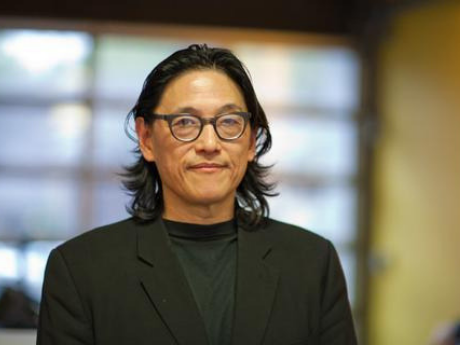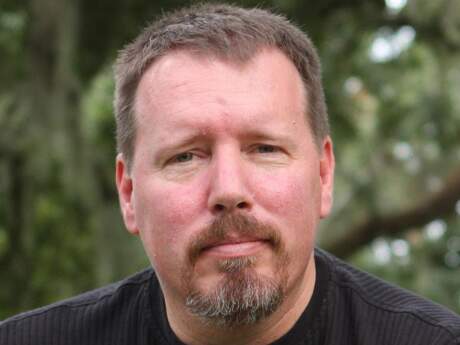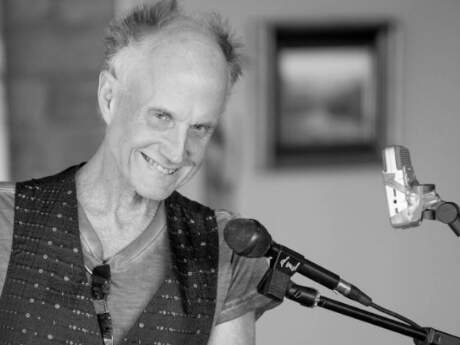Red, White, & Blue
Li-Young Lee

Self-Help for Fellow Refugees
If your name
suggests a country where bells
might have been used for entertainment,
or to announce
the entrances and exits of the seasons
and the birthdays of gods and demons,
it's probably best to dress in plain clothes
when you arrive in the United States.
And try not to talk too loud.
If you happen to have watched armed men
beat and drag your father
out the front door of your house
and into the back of an idling truck,
before your mother jerked you from the threshold
and buried your face in her skirt folds,
try not to judge your mother
too harshly. Don't ask her
what she thought she was doing,
turning a child's eyes away
from history
and toward that place all human aching starts.
And if, one day, you meet someone
in your adopted country and believe
you see in the other's face an open sky,
some promise of a new beginning,
it probably means
you're standing too far away.
Or if you think you read
in the other, as in a book
whose first and last pages are missing,
the story of your own birthplace, a country twice erased,
once by fire, once by forgetfulness,
it probably means you're standing too close.
In any case, try
not to let another carry
the burden of your own nostalgia or hope.
And if you're one of those
whose left side of the face doesn't match
the right, it might be a clue
looking the other way was a habit
your predecessors found useful for survival.
Don't lament
not being beautiful.
Get used to seeing while not seeing.
Get busy remembering
while forgetting. Dying to live
while not wanting to go on.
Very likely, your ancestors decorated their bells
of every shape and size
with elaborate calendars and diagrams
of distant star systems,
but no maps
for scattered descendants.
And I bet you can't say
what language your father spoke
when he shouted to your mother
from the back of the truck, "Let the boy see!"
Maybe it wasn't the language you used at home.
Maybe it was a forbidden language.
Or maybe there was too much screaming
and weeping
and the noise of guns in the streets.
It doesn't matter.
What matters is this:
The kingdom of heaven is good.
But heaven on earth is better.
Thinking is good.
But living is better.
Alone
in your favorite chair
with a book you enjoy
is fine. But spooning
is even better.
"Self-Help for Fellow Refugees" from Behind My Eyes (W.W. Norton, 2008) is reprinted with the permission of the author. All rights reserved.
Do you value the examination of the political in poetry? If so, what experience(s) taught you its importance?
Upon first reading your question, I was sure I knew what you meant by "the political". Yet, as I attempted the beginnings of an answer, I was disturbed to find that the referent was actually quite vague to me, elusive to the point of my having to re-formulate your question variously in order to fix the target, but only to discover that each re-casting of the query left the subject just as indefinite. I found myself asking, for instance, and keeping in mind dictionary parameters of "political": Do you value the examination of governmental affairs in poetry? Do you value the examination of temporal power structures in poetry? Do you value the examination in poetry of the human being seen as a member of a citizenry or political party? As a member of a race or gender? As a member of any demographic? Do you value the examination in poetry of human cruelty practiced as state policy? Do you value the examination of injustice in poetry? Do you value the examination in poetry of human suffering? Etc. My answer to all of these is "yes", all the while remembering that, for me, even the smallest individual person exists beyond the definition of any demography invented by any human power, and a poem must, first and foremost, possess spiritual authority, not just temporal power. In fact, for me, among all the temporal power structures invented by human beings, the state included, a poem is that one which must play host to something beyond the human. Except a poem speaks to my spirit, I find it a noisy cymbal. But perhaps, better than trying to answer whether or not I value the examination of this or that specific, limited dimension of a human being, I might just say: I value comprehensive definitions of essential human nature. Of course, that necessarily includes the socio-political, and the personal, and the psychological, and the metaphysical, each of these orientations in turn corresponding to what I've imagined to be, at the risk of over-simplification, a public self (the face and voice we unfold to strangers), a private self (the face and voice we unfold to our intimates), a secret self (the face and voice we unfold to ourselves), and an unknown self (the face and voice we only sometimes glimpse or overhear when the previous three orientations are abandoned or abandoning, or merely in recession). It's possible that my having been the victim of inadequate definitions of the human and the violence that such poor definitions engender, definitions which are less than comprehensive and derived from non-essential terms, has moved me to seek out more comprehensive definitions of the essentially human.
If you write about politics frequently, what issues, difficulties, advantages and disadvantages do you negotiate? Which poets do you draw on when conducting such negotiations?
Issues: When I hear "poetry" and "politics" in the same sentence, I wonder: How do powers of representation and our ideas about representation in one quarter influence the other quarter? What's common and different between choosing words to represent us and selecting persons to represent us? How do our images and ideas of personhood inform our choices and selections of words? How do such images and ides inform our elections of persons for office? What are the consequences of choices determined by unexamined or inadequate or incomplete ideas about personhood? What are the consequences of poor representations in poetry? In politics? What are the consequences of just representations in poetry and/or politics? How are groups of words different from groups of people? When is a group of words a phrase, a sentence, a paragraph? When is a group of persons a family, a club, a business, a country? What governs a phrase, a line, a stanza, a poem? What governs a people, a business, a school, a guild, a gang, a community, a nation? What governs a poem from the inside? From the outside? What governs people from the inside? Are people governable from the outside? Is there such a thing as an ungoverned poem? Is it possible for people living in groups to be ungoverned? Is "spooky action at a distance" a form of governance? What do poems and persons have in common and difference? Can what we say about poems be said about persons? Can what we say about persons be said about poems? Is one representative of another? What does a poem represent? What might a person represent? Is a person made more or less, truer or less true, by being representative of something other than his or her self? If a representative is a carrier of projections, can a person who carries certain negative projections of a dominant culture (projections based on concepts of race, gender, class, age, you name it) grow beyond those projections to be a happy, fruitful, loving person who is safe to be around? In other words, can a person evolve into a safe human being when that person lives in an unsafe environment? Is any world, great or small, safe when left in the keeping of a person or persons who are incapable of love and all of its forms: charity, sympathy, empathy, compassion, etc.? Is any world safe when inhabited by unsafe people? What is a safe person? What is an unsafe person? What is true security? In a world where security and privacy are premiums, can we afford not to know what a truly safe person is, and how to live as one, how to raise one if you're a parent, how to educate for one if you're a teacher, and what does it all have to do with the public self, the private self, the secret self, and the unknown self? What does it all have to do with knowledge of these several selves? What is the cost of having no self-knowledge? What if our culture is schizophrenic? What does it mean if the individuals that make up a culture are, on the one hand, enamored of dangerous, unsafe personalities, and yet do everything they can to keep themselves untouchable? Let me lean on Rene Guenon, who leaned on the Vedas, and venture this: As Cosmos finds natural expression in the realized individual, a safe society should reproduce the constitution of the Universal Human Being. But what if we don't know what that is? Let me echo King Solomon: "Where there is no vision, the people perish." Sources I draw on include: The Vedas, The Dao De Jing, The Bible, Shakespeare.
What 'responsibility' does an artist have to artistically engage his or her own politic?
Personally, I feel it is my responsibility to engage my whole being, as comprehensive a definition of my essential nature as possible.
In 2008, Horace Engdahl, the secretary of the Nobel prize jury, wagged his finger at American writing saying that "[American writers] don't really participate in the big dialogue of literature. […] That ignorance is restraining." What do you think? How have recent American poets engaged with or neglected the so-called 'big dialogue' of literature? Is this 'big dialogue' a political one?
Since I'm not familiar with Horace Engdahl's speech, I can't know what he means by "the big dialogue." Certainly he must mean something bigger than just "the political", which, by definition, is a reduction of the mystery of "the human" to a single, specific aspect: that aspect in which he or she is viewed exclusively in the context of group-determined identities. Did Mr. Engdahl either imply or explicitly say that the "big dialogue" is a political dialogue? Personally, I have to side with Rene Guenon again, who believed that if there is anything missing in contemporary arts and sciences it is knowledge of metaphysics, the Universal, knowledge of principles belonging to the universal order, which alone can validly lay claim to the name of principles at all. The question for me is: Without metaphysics, can art or science have any meaning outside of application to the market economy (reminder: the Nobel Prize is part of the market economy), that is, outside of making more goods to be consumed by nations and governments. Furthermore, arts and sciences are specialized points of view. Each art form and each science is a particular, individual, and specialized viewpoint directed to the study of something. But let's remember that there are many cases of things incapable of being considered from any individual, particular, or specialized standpoint whatsoever, including the political standpoint. That's where Metaphysics enters, which cannot be reckoned as a special view at all.
Is there room for romantic or rugged individualism in political poetry (as opposed to a capacious perspective of Whitman or other past poets)? If so, where is its place?
Forgive me, but I'm not sure I understand your categorizations. How was Whitman not, simultaneously, a capacious soul, a romantic, and a rugged individualist? And what about Shakespeare, who found a place for everything in his work, whose great poetry is full of the romantic, the political, the social, the individual, the psychological, as well as containing human and metaphysical wisdom, knowledge of the human order as well as knowledge of greater, eternal orders?
Where do you draw the line between poetry and propaganda? What is the purpose of such a line? Should today's poet be concerned with editorial censorship?
Propaganda is usually invested in or founded upon definitions of the human that are neither comprehensive nor essential. Given the present milieu, I believe writers today probably need to be aware of many various and subtle kinds of censorships that exist beyond the open and blatant government crackdowns we associate with totalitarian regimes. The public market economy can become a form of censorship. Academic validation and invalidation, another type of market economy, can easily become a form of censorship. Economic inequities could, and probably do, eventuate in a very effective kind of censorship. Let's not forget peer pressure. And then, of course, an individual's own susceptibility to trends and fashions probably participates ultimately in self-censorship.
What are your thoughts on shifts in the state of the political voice in contemporary poetry, from the early modernist to the beat poets and black arts movement, to today? Where are we now? Where are we going?
Forgive me. To be honest, I don't have any thoughts "on shifts in the state of the political voice in contemporary poetry," at least no thoughts older than a few moments, no thoughts I've worried about before reading your question. My own sense is that there hasn't been so much a shift in the political voice as there has been going on, for hundreds of years, a shift from a double axis viewpoint—vertical and horizontal—to a single horizontality, manifested as a gradual and pervasive move away from a cosmic/sacred attitude and toward secularization and profanation of the arts and sciences, and all done under the banner of Humanism. The problem with reducing everything to human proportions is not only the blindness of such a species-specific point of view (the most obvious bad end ensuing from that being ecological disaster), but the elimination of every principle of a higher order than human rationality, which outcomes in an accumulation of unfounded and mutually destructive intra-human theories and fragmentary views of our cosmic estate, all of it leading to nothing, or worse, violence. And I don't buy for one moment that the fractious din we witness in the world, whether in the Middle East or between the red and the blue here at home, has anything to do with so-called "religious" principles. Seeing better, we'll likely see it has to do with money, that exclusively human measure which, as everyone has heard by now, can put a price on everything but not weigh the worth of anything.
* * *
Li-Young Lee'is the author of numerous books including Behind My Eyes (2008) Book of My Nights (2001), which won the 2002 William Carlos Williams Award; The City in Which I Love You (1991), which was the 1990 Lamont Poetry Selection; and Rose (1986), which won the Delmore Schwartz Memorial Poetry Award.
Published September 2012.


